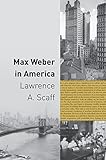Max Weber in America / Lawrence A. Scaff.
Material type: TextPublisher: Princeton, NJ : Princeton University Press, [2011]Copyright date: ©2011Edition: Course BookDescription: 1 online resource (328 p.) : 6 halftonesContent type:
TextPublisher: Princeton, NJ : Princeton University Press, [2011]Copyright date: ©2011Edition: Course BookDescription: 1 online resource (328 p.) : 6 halftonesContent type: - 9780691147796
- 9781400836710
- Sociologists -- Biography -- Germany
- Sociologists -- Germany -- Biography
- Sociology -- History -- United States
- Sociology -- United States -- History
- SOCIAL SCIENCE / Sociology / General
- America
- American Progressivism
- American South
- American exceptionalism
- American frontier
- American modernity
- Americanization
- Chicago
- Congress of Arts and Science
- Europe
- Europeanization
- Ferdinand Krnberger
- Frank Knight
- German immigrants
- Helene Weber
- Hull House
- Indian Territory
- Jane Addams
- Marianne Weber
- Max Weber
- New York City
- New York
- Nineteenth Street Baptist Church
- North Carolina
- North Tonawanda
- Oklahoma
- Pennsylvania
- Protestant ethic
- Protestantism
- Quakers
- Romanticism
- Samuel Gompers
- Talcott Parsons
- Tennessee
- The Protestant Ethic and the Spirit of Capitalism
- Tuskegee
- United States
- University of Heidelberg
- W.E.B Du Bois
- William James
- action
- asceticism
- authority
- capitalism
- caste
- character
- citizenship
- class
- colonial children
- cultural criticism
- cultural pluralism
- culture
- economic action
- education
- ethnicity
- experience
- family
- gender
- historical inquiry
- immigration
- intellectual life
- land allotment
- migrs
- modernity
- nature
- political economy
- political reform
- publication
- race relations
- race
- rationality
- rationalization
- religion
- religious ethics
- religious faith
- religious sects
- romanticism
- scholars
- scholarship
- science
- settlements
- slavery
- social action
- social capital
- social science disciplines
- social sciences
- sociation
- sociology
- status
- stockyards
- traditionalism
- translation
- travel
- tribal membership
- undergraduate courses
- universities
- university curricula
- urban space
- vacation retreat
- working class
- world culture
- 301.092 23
- HM479.W42 S33 2017
- online - DeGruyter
- Issued also in print.
| Item type | Current library | Call number | URL | Status | Notes | Barcode | |
|---|---|---|---|---|---|---|---|
 eBook
eBook
|
Biblioteca "Angelicum" Pont. Univ. S.Tommaso d'Aquino Nuvola online | online - DeGruyter (Browse shelf(Opens below)) | Online access | Not for loan (Accesso limitato) | Accesso per gli utenti autorizzati / Access for authorized users | (dgr)9781400836710 |
Frontmatter -- Contents -- Illustrations -- Preface -- Introduction -- Part 1. The American Journey -- One. Thoughts about America -- Two. The Land of Immigrants -- Three. Capitalism -- Four. Science and World Culture -- Five. Remnants of Romanticism -- Six. The Color Line -- Seven. Different Ways of Life -- Nine. American Modernity -- Ten. Interpretation of the Experience -- Part 2. The Work in America -- Eleven. The Discovery of the Author -- Twelve. The Creation of the Sacred Text -- Thirteen. The Invention of the Theory -- Appendix 1: Max and Marianne Weber's Itinerary for the American Journey in 1904 -- Appendix 2. Max Weber, Selected Correspondence with American Colleagues, 1904-5 -- Archives and Collections Consulted -- Bibliographic Notes -- Index
restricted access online access with authorization star
http://purl.org/coar/access_right/c_16ec
Max Weber, widely considered a founder of sociology and the modern social sciences, visited the United States in 1904 with his wife Marianne. The trip was a turning point in Weber's life and it played a pivotal role in shaping his ideas, yet until now virtually our only source of information about the trip was Marianne Weber's faithful but not always reliable 1926 biography of her husband.Max Weber in America carefully reconstructs this important episode in Weber's career, and shows how the subsequent critical reception of Weber's work was as American a story as the trip itself. Lawrence Scaff provides new details about Weber's visit to the United States--what he did, what he saw, whom he met and why, and how these experiences profoundly influenced Weber's thought on immigration, capitalism, science and culture, Romanticism, race, diversity, Protestantism, and modernity. Scaff traces Weber's impact on the development of the social sciences in the United States following his death in 1920, examining how Weber's ideas were interpreted, translated, and disseminated by American scholars such as Talcott Parsons and Frank Knight, and how the Weberian canon, codified in America, was reintroduced into Europe after World War II. A landmark work by a leading Weber scholar, Max Weber in America will fundamentally transform our understanding of this influential thinker and his place in the history of sociology and the social sciences.
Issued also in print.
Mode of access: Internet via World Wide Web.
In English.
Description based on online resource; title from PDF title page (publisher's Web site, viewed 29. Jul 2021)


